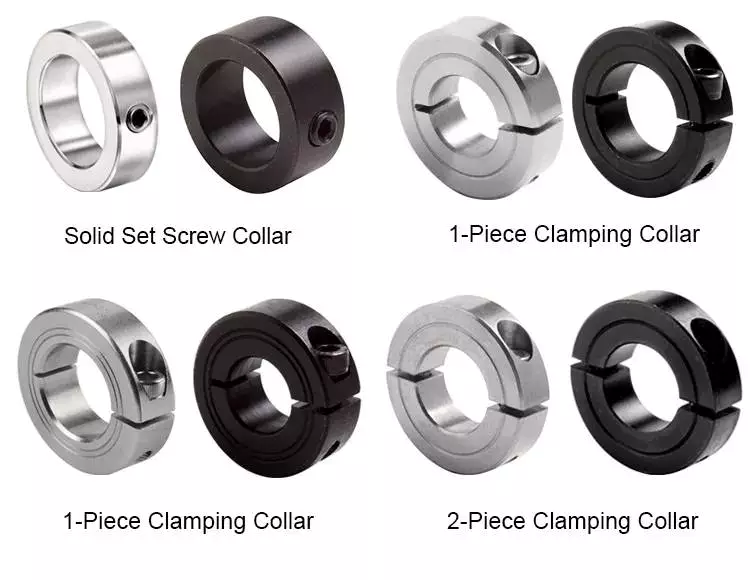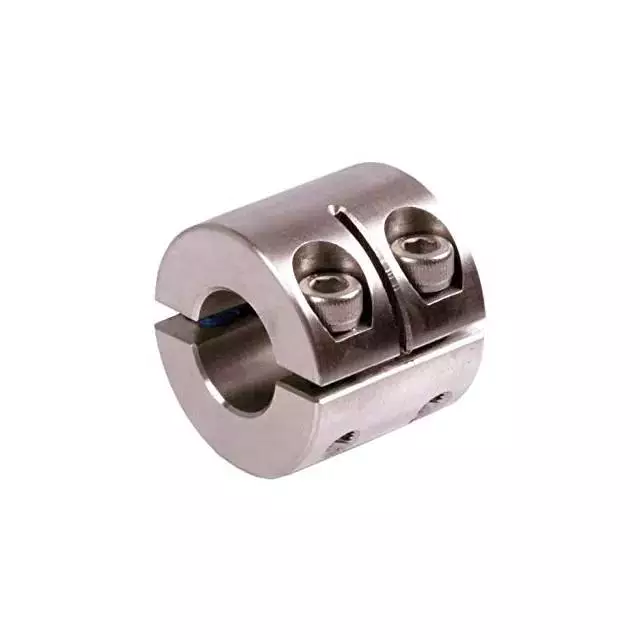
Can I get recommendations for shaft collars suitable for use in harsh environments?
Yes, there are specific types of shaft collars that are designed to withstand harsh environments and provide reliable performance. When selecting shaft collars for use in such conditions, it is important to consider factors such as temperature extremes, exposure to moisture or chemicals, abrasive environments, and high vibration or shock. Here are some recommendations for shaft collars suitable for use in harsh environments:
- Stainless Steel Shaft Collars: Stainless steel shaft collars are highly resistant to corrosion and can withstand harsh environments with exposure to moisture, chemicals, or abrasive substances. They offer excellent durability and are suitable for applications in industries such as marine, food processing, chemical processing, or outdoor equipment where reliability and resistance to rust and corrosion are critical.
- Plated Shaft Collars: Plated shaft collars, such as zinc-plated or nickel-plated collars, provide an added layer of protection against corrosion and wear. These collars are often used in harsh industrial environments where exposure to chemicals, humidity, or outdoor elements is a concern. The plating helps to prevent rust and can extend the lifespan of the collars in challenging conditions.
- Shaft Collars with Seals or Gaskets: Some shaft collars are designed with integrated seals or gaskets to provide additional protection against moisture, dust, and contaminants. These collars create a barrier between the collar and the shaft, preventing the entry of debris or liquids. They are commonly used in applications where water or dust ingress is a potential issue, such as outdoor equipment, agricultural machinery, or industrial machinery in dusty environments.
- High-Temperature Shaft Collars: For harsh environments with high-temperature conditions, it is important to select shaft collars that can withstand the heat without deformation or degradation. High-temperature shaft collars, often made from heat-resistant alloys or ceramics, are designed to handle extreme temperatures. These collars are suitable for applications in industries such as aerospace, automotive, or furnace equipment where exposure to high heat is a concern.
- Specialized Coatings or Materials: In some cases, specialized coatings or materials can be applied to shaft collars to enhance their resistance to specific harsh conditions. For example, coatings such as Teflon or epoxy can provide additional protection against chemicals or abrasion. Additionally, certain materials like titanium or Hastelloy offer superior resistance to corrosion and can be utilized in highly corrosive environments.
When choosing shaft collars for harsh environments, it is recommended to consult with manufacturers or suppliers who have expertise in providing solutions for challenging conditions. They can offer guidance on selecting the most suitable collar materials, designs, and additional features based on your specific application requirements and the severity of the harsh environment.

Where can I find information on the materials used in manufacturing shaft collars?
If you are looking for information on the materials used in manufacturing shaft collars, there are several sources where you can find relevant information. Here are some common resources to consider:
- Manufacturer Websites: Many manufacturers of shaft collars provide detailed information about the materials they use in their product specifications or technical datasheets. Visiting the websites of specific collar manufacturers and exploring their product documentation or resources section can help you find information about the materials used in their collars. This information may include the type of material (such as steel, stainless steel, aluminum, or plastic) and any specific properties or characteristics associated with the material.
- Product Catalogs and Brochures: Manufacturers often publish product catalogs or brochures that provide an overview of their collar offerings. These catalogs may include information about the materials used in manufacturing the collars. You can request catalogs from manufacturers directly or check their websites for downloadable versions. The catalogs may highlight the material properties and advantages of using specific materials for different applications.
- Material Databases: Online material databases or directories can be valuable resources for finding information about specific materials used in manufacturing shaft collars. These databases typically provide comprehensive information about various materials, including their composition, mechanical properties, corrosion resistance, temperature tolerance, and other relevant characteristics. Examples of such databases include MatWeb, Engineering Toolbox, or specialized materials databases maintained by industry organizations or universities.
- Technical Standards and Specifications: Technical standards and specifications related to mechanical components can often include information about the materials used in their construction. Standards organizations or industry associations may release documents that outline the material requirements for shaft collars or provide guidelines for material selection. Accessing these standards or specifications can provide insights into the recommended materials for shaft collar manufacturing.
- Consulting with Manufacturers or Suppliers: If you have specific questions about the materials used in manufacturing shaft collars, reaching out directly to manufacturers or suppliers can be beneficial. They can provide detailed information about the materials they use, including their composition, properties, and any specific treatments or coatings applied to enhance performance. Contacting manufacturers or suppliers allows for direct communication and the opportunity to address any specific concerns or requirements you may have.
When seeking information on materials used in shaft collar manufacturing, it is important to consider factors such as desired properties (e.g., strength, corrosion resistance), environmental compatibility, and application-specific requirements. This will help you make informed decisions about selecting shaft collars that are suitable for your specific needs and operating conditions.

What is a shaft collar and its role in mechanical systems?
A shaft collar is a mechanical component used in various applications to provide support, positioning, and locking functions for rotating shafts. It is a cylindrical device that fits around a shaft and is typically secured in place using set screws or clamping mechanisms. The collar is designed to prevent axial movement of the shaft and maintain its position within a mechanical system. Here is a detailed explanation of the role and significance of shaft collars in mechanical systems:
Support and Positioning:
One of the primary roles of a shaft collar is to provide support and positioning for a shaft within a mechanical system. It acts as a physical barrier that prevents the shaft from moving along its axial direction. By securing the collar at a specific location along the shaft, it helps maintain the desired position of the shaft relative to other components, such as bearings, gears, or pulleys. This support and positioning function ensures proper alignment and operation of the system, preventing unwanted vibrations, misalignment, or excessive wear.
Axial Load Distribution:
Shaft collars also help distribute axial loads along the length of the shaft. When a mechanical system experiences axial forces or thrust, the collar can help transmit and distribute these forces to the supporting components, such as bearings or thrust washers. By evenly distributing the load, shaft collars help prevent localized stress concentrations and improve the overall load-bearing capacity of the system.
Limiting Radial Movement:
In addition to preventing axial movement, shaft collars can also limit radial movement of the shaft within a given range. The collar’s design and tight fit around the shaft create a mechanical barrier that restricts radial play or shifting of the shaft. This is particularly important in applications where precise positioning or clearance control is required, such as in linear motion systems, conveyor systems, or machinery with rotating components.
Securing Components:
Shaft collars often serve as a means of securing other components onto the shaft. They can act as a stopping point or reference surface against which other elements, such as bearings, sprockets, gears, or pulleys, can be mounted. By securing these components with set screws or clamping mechanisms, shaft collars ensure their proper alignment and prevent unintentional movement or disengagement during operation.
Adjustability and Easy Installation:
Another advantage of shaft collars is their adjustability and ease of installation. They can be easily positioned and moved along the shaft without requiring complex tools or specialized equipment. This adjustability allows for fine-tuning of the shaft’s position and alignment within the system. Additionally, the simplicity of their design and installation makes shaft collars a cost-effective solution for various mechanical applications.
Overall, shaft collars play a significant role in mechanical systems by providing support, positioning, load distribution, and component securing functions. Their presence helps ensure the stability, alignment, and efficient operation of rotating shafts in diverse applications across industries such as manufacturing, automation, robotics, and machinery.


editor by CX 2023-12-25